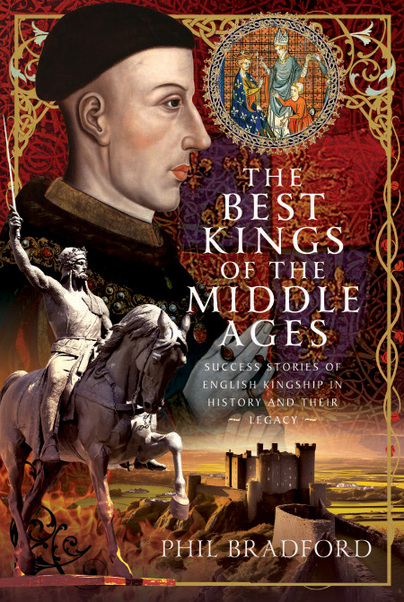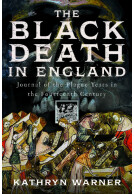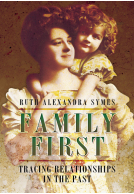The Best Kings of the Middle Ages (Hardback)
Success Stories of English Kingship in History and Their Legacy
Imprint: Pen & Sword History
Pages: 280
Illustrations: 16pp mono plates
ISBN: 9781399087278
Published: 12th June 2025
(click here for international delivery rates)
Need a currency converter? Check XE.com for live rates
| Other formats available | Price |
|---|---|
| The Best Kings of the Middle Ages eBook (10.9 MB) Add to Basket | £18.99 |
Henry II. Richard I. Edward I. Edward III. Henry V. Five men seen as success stories of Medieval English kingship. Three inherited tarnished crowns and restored their glory. Legal reformers and warriors, they ruled over widespread lands for decades, upholding justice, expanding their authority and changing their realms. Two others are the most famous of warrior kings, their short reigns encompassing crusades and legendary victories. Contemporary writers often waxed lyrical about them as ideals of kingship. Many modern writers have been similarly enthusiastic.
Is this justified? Alongside the story of success are other narratives, ones showing these kings in a more ambiguous light. We have the murder of archbishops, the massacre and expulsion of religious minorities, actions in battles and sieges, which today we would see as war crimes. Claims for their greatness sit uneasily with darker moments and legacies which challenge how we approach their reputations today.
This book looks at the lives of these kings and how those reputations have been shaped across the centuries, from medieval contemporaries to the modern day, in both history and fiction. Having weighed the evidence, it seeks to determine the answer to the question: were these really great kings, the best monarchs of the Middle Ages?
Rating: 5 out of 5 stars
NetGalley, Carol Faulconbridge
This book discusses the history of 6 medieval kings and after a detailed report about their history the conclusion as to whether they could be described as good.
I really enjoyed reading the comparisons between the kings and then the 3nd of each piece the author lists all of the biographies and fiction written about each king.
Each piece was incredibly well researched and then the book ends by deciding which of these kings could be described as good kings.
Rating: 5 out of 5 stars
NetGalley, Andrea Romance
This book re-examines the lives of five celebrated medieval English kings—Henry II, Richard I, Edward I, Edward III, and Henry V—analyzing their achievements alongside their controversial actions and legacies to determine whether their reputation for greatness is truly justified.
This engaging and easy-to-read book does a good job of providing short biographies of the five kings, examining their reputations through the centuries, and determining how effective they truly were. It’s an enjoyable and informative read.
Rating: 5 out of 5 stars
NetGalley, AJ Sefton
There was a time when kings really were kings: the Middle Ages. They ruled totally, had the power to change the world and were swiftly deposed if they didn't make the cut. Suffice to say, there were quite a few kings in Medieval England and this book selects the best of them.
In terms of legacy, it is a list that is hard to argue against: Henry II, Richard I, Edward I, Edward III and Henry V. Henry II's reign is often overshadowed by the murder of Thomas Becket, while Richard the Lionheart was beloved by the Victorians even though he spent only months in England (hardly my idea of a great English king) also tied in with the stories of Robin Hood; Edward I for his attempts to form a united kingdom by fighting the Scots and Welsh as well as his parliamentary reforms; Edward III made England into a huge power by fighting the French and starting the Hundred Years War; and Henry V has so much written about his part in the Hundred Years War and especially the Battle of Agincourt, and has a Shakespeare play written about him. Superstar king.
Phil Bradford looks at the qualities expected of a Medieval king and then goes through the five selected kings in a structured manner, considering their life and reign, personal qualities, how they are portrayed in culture and their legacy, and finally a verdict. At the end there is a conclusion where three kings rise above the others. In total agreement here.
This is not an academic report but the book is written in a very modern way therefore making an enjoyable and accessible read for everyone. The evidence is from secondary sources from across a vast timeline, including some very modern biographies and the views of Sir Winston Churchill, a fine historian himself. Are the kings' reputations fair o not?
An informative, knowledgeable and very interesting account of kings and monarchy from the Middle Ages, intensely readable. Recommended.
Rating: 5 out of 5 stars
NetGalley, Nicholas Artrip
How does one quantify something like “best king?” Those who were successfully able to navigate the expectations of their subjects and their role as monarchs. Bradford explains that this involves being an overtly Christian rule who defends the rights of the Church, maintaining law and order and the defense of the realm, and understanding the wisdom in seeking counsel and obtaining popular consent. Using these metrics, Bradford convincingly makes the case for each monarch featured in the book with the information highlighted. The author then guides us through how views of the kings shifted with time and context, making this a terrific resource.
Bradford knows how to share history! This book was quite easy to sink into, informative but also entertaining. The discussion of Henry II and Thomas Becket was excellent and helpful in understanding the cultural machine that has shaped our thinking about one of the most notorious incidents of the twelfth century. I also loved the section about Richard I whose life offers a fascinating study of contradictions and whose reputation I’ve never quite been able to understand. Bradford handles discussion of his sexuality and legacy in a balanced and sensitive manner that I really appreciated. Edward III’s chapter helped me to make sense of what at times feels like an uneven legacy, and the chapters on Edward I and Henry V were equally enthralling.
Phil Bradford delivers a sharp, well-researched, and highly engaging look at five of England’s most celebrated monarchs — but what makes The Best Kings of the Middle Ages stand out is how it interrogates those reputations without losing sight of the complexity and humanity behind the crowns.
NetGalley, Chelsea Dugan
This book does what the best historical nonfiction should: it invites readers to think critically. Yes, Henry II, Richard I, Edward I, Edward III, and Henry V were formidable rulers — legal reformers, warriors, and empire-builders. But Bradford refuses to romanticize. He addresses the violence, intolerance, and ruthlessness that often accompanied their accomplishments. The treatment of minorities, the use of brutal tactics in war, and personal power struggles are all laid bare, giving readers a more honest — and ultimately more interesting — portrait of kingship.
The writing strikes a perfect balance between scholarly and accessible. Whether you’re a casual reader of medieval history or a devoted enthusiast, this book has plenty to offer. The inclusion of how modern perceptions of these kings have evolved over time — in both serious historical texts and pop culture — adds another layer that I really appreciated.
Massive thanks to Pen & Sword and NetGalley for the ARC. I’m always excited to read their titles, and this one was no exception — compelling, thought-provoking, and beautifully put together.
Rating: 5 out of 5 stars
NetGalley, Stephen Dale
In the author's own words, "This is not an academic tome" but what it is is a fairly light-hearted look at five kings and full of facts making it a very interesting and entertaining read.
It starts with Henry II, a 'man of many parts' who reigned for 35 years before moving on to Richard I who reputation was probably based on his valour but was he a king in name only? He was a man of contradictions and generated centuries of 'a legend' with names such as Ivanhoe and Robin Hood. He should not be judged by today's standards and may be considered as a failed crusader who left no legacy.
Edward I left an undeniable impact mainly perhaps for expelling Jews from the country in 1290 which lasted centuries until 1656. After his death he received mixed reviews especially from his dealings with Scotland.
Edward III had 35 years of a decent reign before fading into 15 years of a sad and decaying end and we finish with perhaps the most famous,
Henry V who died at the early age of 35, a pioneer and a 'propaganda genius'.
At the end of each monarch the author gives very interesting information on how theses kings were considered through the centuries after their deaths followed by a critique of 20C and 21C books/plays and films that may have been written about them.
All in all an excellent read and much recommended.
I like how the author covers events from a different perspective and with different interpretations from others I’ve read. After going through the life events of each king, the author then covers each king’s legacy through the centuries, starting with shortly after their deaths, through the Reformation and Victorian Era, up until recent times in books and films. It’s fascinating to see how the kings’ reputations and legacies have changed as the times have changed.
NetGalley, Carren Joye
About Phil Bradford
Phil Bradford gained his PhD in medieval history, specialising in the fourteenth-century parliament, at the University of York, where he is now Honorary Visiting Fellow. Having trained in Cambridge and Lima, he was ordained into the Church of England in 2010. Currently, he works as a parish priest in Worcester, while also overseeing a link with the Anglican Church of Peru. Throughout, he has continued to enjoy studying the Middle Ages and has published work on the late medieval parliament and monarchy, including co-editing volumes of parliamentary records. More recently, he has been part of an interdisciplinary team studying the medieval Gough Map of Britain.
















